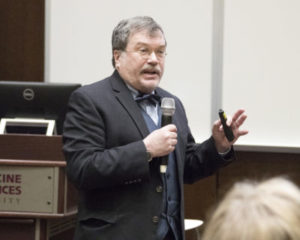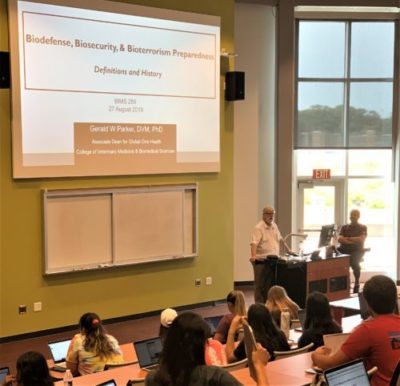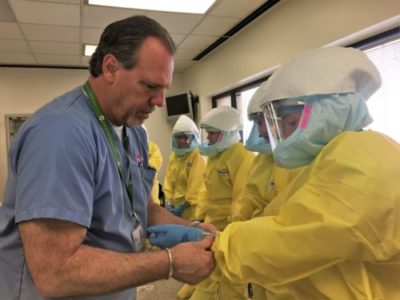
One Health Education at Texas A&M
Creating interdisciplinary learning opportunities is essential to educating the next generation of scientists, public servants, and thought leaders. Seminar series, biosecurity workshops, outbreak simulation exercises, education abroad opportunities, and multidisciplinary courses are just some of the ways Global One Health has previously engaged with Texas A&M students interested in One Health.
Seminars & Guest Lectures
Texas A&M Global One Health has supported community education by hosting seminars and guest lectures. The idea is to bring students and faculty across campus together with global health professionals to explore the many ways their current and future careers can make an impact in the realms of global health and health security.

Courses
Previous course offerings that employed a One Health approach included:
- BIMS 110: One Health in Action (reference syllabus)
- VIBS 111: Biodefense, Biosecurity, and Bioterrorism (pictured right; reference syllabus)
- BIMS 489: Twenty-First Century Global One Health (reference syllabus)
- BIMS 489: Twenty-First Century Biological Threats (reference syllabus)
- INTA 689: Infectious Diseases in the Developing World: Risks, Challenges and Solutions
- VTPB 411: One Health and Ecology in the Tropics
- INTA 689: Bioterrorism
Partner Programs
Global One Health educational and student research opportunities have historically been available across the Texas A&M campus.
Pandemic & Biosecurity Policy Program
Housed at the Scowcroft Institute of International Affairs in The Bush School of Government & Public Service, the Pandemic & Biosecurity Policy Program focuses on policy, education, and research in the areas of infectious disease, biosecurity, bioterrorism, and pandemic preparedness and response.
The program hosts an annual policy summit and annual policy forum in College Station and Washington, D.C., respectively, bringing together students, researchers, policymakers, nongovernmental organizations, and industry leaders. As part of the summit, students participate in an engaging outbreak simulation after which they present to summit attendees and can contribute to a simulation white paper. The simulation white paper debuts alongside a summit white paper with policy recommendations at the Washington, D.C., forum event.

Field Experience in One Health & Outbreak Investigation
Each summer, Texas A&M University graduate students join students from The University of Texas Rio Grande Valley (UTRGV) and The University of Texas Medical Branch at Galveston (UTMB) for an experiential One Health course.
The students travel across Texas and work together to learn how to address the complex problems facing human, animal, and environmental health, including:
- Veterinary health and zoonotic diseases
- Wildlife biology and vector dynamics
- Public health and epidemiological methods
- Fieldwork and specimen collection/analysis
- Molecular diagnostics and countermeasure development
- Biosafety and biosecurity
- Clinical skills and reasoning
- Outbreak evaluation and response
- Socio-ecological systems thinking and political ecology
News Coverage from the 2019 Program
- Graduate Students Participate in Mock Press Conference | June 5, 2019
- UTRGV Partners with TAMU, UTMB in Outbreak Investigation Course | June 5, 2019
- Hands-on graduate class introduces students to One Health approach | June 22, 2019
- Student Perspective: One Health Course | June 30, 2019
- VMBS Collaborates on ‘One Health’ Disease Outbreak Simulation Course | July 3, 2019
Aggie Research Leadership Program & Aggie Research Scholars Program
These programs invite undergraduate students, graduate students, and postdoctoral fellows to participate in research at Texas A&M and offer a wide variety of One Health-related research projects.
Two complementary programs have been established to help Aggies create their own leadership and research opportunities, regardless of vocational goal, discipline of study, or level of experience. They are:
- The Aggie Research Leadership Program is for graduate students and postdoctoral fellows to gain experience managing and mentoring diverse research teams.
- The Aggie Research Scholars Program is for undergraduates to gain experience collaborating in multidisciplinary teams to produce innovative research.
Team leaders and faculty mentors have created more than 1,800 undergraduate research opportunities since Spring 2016.
For a list of current opportunities, visit aggieresearch.tamu.edu.
